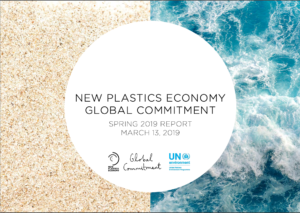Our daily lives and entire economic model are tied up in plastics. However, they are also one of the most problematic materials for our environment, with over 8 million tonnes of plastics entering our oceans each year (read more here). To address this, organizations such as the Ellen Macarthur Foundation are tackling the issue at its source, demanding commitments, transparency and accountability from those producing and using plastics.
 Just last week, during the 27th March plenary session, the EU voted to ban the use of certain single-use plastic products. This was a welcome follow up to the New Plastics Economy initiative, led by the Ellen MacArthur Foundation in collaboration with UN Environment, that published the Spring 2019 New Plastics Economy Global Commitment Report on the 13th of March. The Report brings together businesses, governments and other organizations (over 350 signatories that together make up around 20% of the global plastic packaging market) in establishing plastic waste and pollution reduction targets. Key pledges in the report include:
Just last week, during the 27th March plenary session, the EU voted to ban the use of certain single-use plastic products. This was a welcome follow up to the New Plastics Economy initiative, led by the Ellen MacArthur Foundation in collaboration with UN Environment, that published the Spring 2019 New Plastics Economy Global Commitment Report on the 13th of March. The Report brings together businesses, governments and other organizations (over 350 signatories that together make up around 20% of the global plastic packaging market) in establishing plastic waste and pollution reduction targets. Key pledges in the report include:
- Consumer goods companies and retailers commit to increase recycled content in their packaging to an average of 25% by 2025, compared with the current global average of just 2%.
- Leading businesses and governments will end the use of problematic and unnecessary plastic – including PVC and single-use plastic straws and carrier bags – many of them by the end of this year
- 40 brands and retailers are piloting or expanding reuse and refill schemes
However, at a difference to past reports and in an unprecedented move, some major companies also chose to release information on their total annual use of plastic packaging; a gamechanger in obtaining information on where plastic waste and pollution is coming from.
The report reads: “Many of these companies are publishing this information for the first time. This is an important step forward to create transparency. We applaud the companies that are publishing this data, and encourage all other companies that make and use plastics to follow their lead.”
The Coca-Cola company, one of the largest companies included in the report, disclosed its annual plastic packaging volumes for the first time: three million tonnes including both virgin and recycled plastics in its 2018 global operations alone. By disclosing this information, companies set a benchmark with their peers and push each other towards better sustainability.
Information is power and knowing how much and who is producing, using and disposing of plastics is a vital ingredient in tackling plastic waste and pollution. The report is an important step forward. It demonstrates how a change in mentality by large players in the sector can act as a drive for positive change and accelerate the transition to more sustainable practices.
Read the full Report.
Read this week’s Plenary Session highlights.






